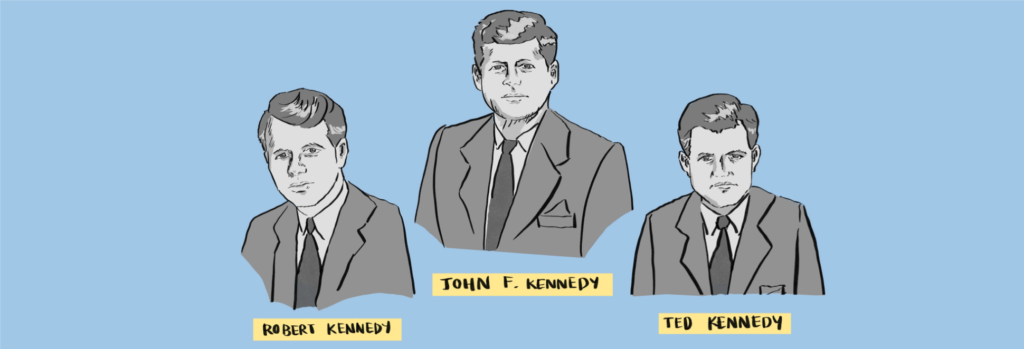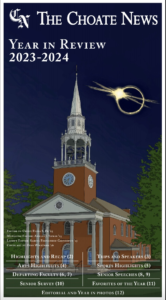
Graphic by Evelyn Kim ’25/The Choate News
By Francesca Howard ’26 Copy Editor
America has a nepotism problem — and no, I’m not referring to Lily-Rose Depp’s acting debut or Zooey Deschanel claiming that she is self-made. I hate bad acting and hubristic celebrities just as much as the next person, but America’s nepotism problem is more worrisomely prevalent on Capitol Hill, where having a family in high places is king.
Those who hail from these “political dynasties” embark on their campaign trails with pre-established networks of influential supporters and donors at the ready. These connections translate into greater visibility and, ultimately, electoral success. Essentially, in this system, political influence can become an inherited trait.
“Nepo babies” aren’t a new concept. For almost all of human history, leadership has been handed down from generation to generation, a practice that was once believed to maintain stability and ensure smooth transitions of power. The Zhou dynasty in China lasted nearly 800 years. The House of Habsburg ruled Austria-Hungary from 1282 to 1918. The British royal family dates back to the 1500s.
In comparison, America’s dynasty problem doesn’t seem that bad at all. It holds presidential elections every four years and has no singular ruling family. Though it might not necessarily have dynasties in the traditional sense, America has always been dynastical by nature, and there are a slew of examples to prove it. One of the very first instances of political nepotism in the United States was in 1797, when Former President John Adams appointed his son, son-in-law, and father-in-law to key positions in his administration.
Another example of a family that embodies political nepotism is the Kennedys. In 1960, Former President John F. Kennedy ’35 (JFK) appointed his brother Robert F. Kennedy as Attorney General, despite Robert having never tried a case in a courtroom before. JFK justified his decision by claiming he wanted his brother to gain some experience before moving into private practice. Around that time, Joe Kennedy, JFK’s father, was also the United States Ambassador to the United Kingdom, and Ted Kennedy, JFK’s younger brother, was a State Senator in Massachusetts. This year, America witnessed a Kennedy resurgence, with Robert F. Kennedy Jr. (RFK) announcing his 2024 presidential candidacy. In one of his speeches, RFK referenced his father, Robert F. Kennedy Sr., and uncle, John F. Kennedy, more than 20 times. Though RFK positions himself as the change America needs by promising to shake up the established order, one must wonder how much disruption can realistically be expected from a scion of one of America’s most storied political families.
Historically, such familial ties have been common. According to data compiled by congressional historians between 1789 and 2016, 400 parent-child duos and 190 sibling pairs have served in Congress. In 1848, more than 16% of Congress members were filling the seat of a direct relative. This directly undermines the principles of meritocracy and can lead to a lack of diversity in perspectives.
Americans seem to have developed an infatuation with political lineage. Come election day, people will vote for what they know, even if that is just a name. This is because of the recognition heuristic, a tendency for humans to place a higher value on something they recognize rather than something unfamiliar. As political scientists Warren E. Miller and Donald E Stokes said, “Recognition carries a positive valence; to be perceived at all is to be perceived favorably.”
These names have become more than surnames; they are brands. Even when people don’t know anything about their policies or campaigns, simply hearing names that have been tossed around before makes them legitimately consider casting a vote in their favor. That is why signs and slogans are so common. You don’t see signs posted about Kennedy’s plans to reform the healthcare system; you see a sign with the name Kennedy.
This may not seem like a problem at first glance. After all, couldn’t the same be said about any other profession? A chef’s son is unlikely to be a lousy cook. A businessman’s daughter will probably grow up to know the tricks of the trade. However innocuous these scenarios might be in the culinary or business world, this hereditary advantage is particularly troublesome when applied on a larger scale in politics. “Nepo babies” inherit not just a secret recipe or an investment hack but a name with considerable power and influence, significantly more than the average citizen could ever hope to achieve.
Nepotism in politics results in an administration that is inept and prone to making decisions based on personal affairs rather than the nation’s best interests. By its very nature, nepotism gives an undue advantage to those who would otherwise not possess the best credentials for governance. Dynasts ascend to positions of power not based on their qualifications or political acumen, but rather by their pedigree. This frequently results in governmental incompetencies and substandard policy outcomes. That is not to say that every “nepo baby” will automatically be a bad leader, but the process of being elected certainly leans in their favor. They are often held to less rigorous standards than their non-nepo counterparts and thus have it easier. As a democracy, America needs to question why its elections have become almost predetermined, why jobs have become something inherited and not earned, and why the adage “it’s not what you know, but who you know” has become so evidently true for its politics.
American politicians have been keeping it in the family for centuries. While there needs to be more procedural stringency to close the loopholes politicians are bypassing to maximize their power, it would be unfair to blame the consequences of nepotism solely on the “nepo babies” and their parents. At the end of the day, America as a society is at fault. The people’s indignation has never translated into action. It’s time to jettison the nepotism that favors the few at the expense of the many. It’s time we stop saying we want change and start voting for it. America’s government should not be run like a family business. The presidency is not a family heirloom to be passed from one generation to the next. America is not a country of the people, by the people, and for the people; but it can be — and it’s up to the people to make sure that change happens.




